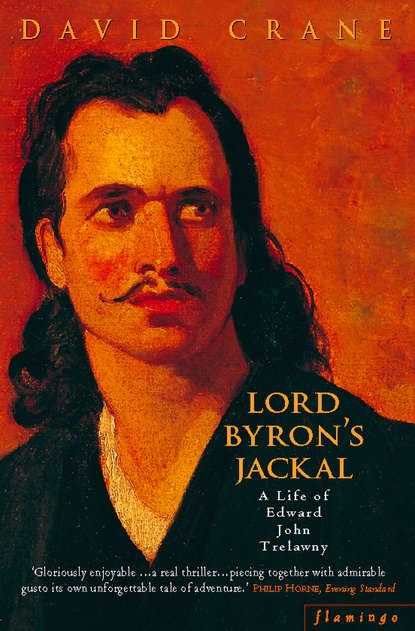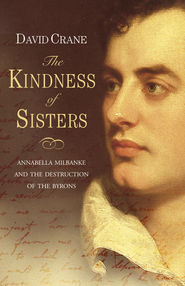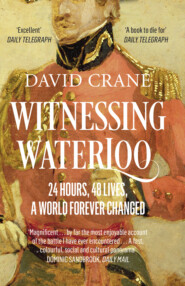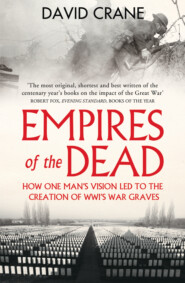По всем вопросам обращайтесь на: info@litportal.ru
(©) 2003-2024.
✖
Lord Byron’s Jackal: A Life of Trelawny
Настройки чтения
Размер шрифта
Высота строк
Поля
And long accustom’d bondage uncreate?
Not such thy sons who whilome did await,
The hopeless warriors of a willing doom,
In bleak Thermopylae’s sepulchral strait –
Oh! who that gallant spirit shall resume,
Leap from Eurotas’ banks, and call thee from the tomb?
Where’er we tread ’tis haunted, holy ground;
No earth of thine is lost in vulgar mould,
But one vast realm of wonder spreads around,
And all the Muse’s tales seem truly told,
Till the sense aches with gazing to behold
The scenes our earliest dreams have dwelt upon;
Each hill and dale, each deepening glen and wold
Defies the power which crush’d thy temples gone:
Age shakes Athena’s tower, but spares gray Marathon.
(#litres_trial_promo)
There is not an idea here that was new – not an idea of any sort it could be argued – but faced with verses of this power it is as idle to think of Byron as a product of Philhellenism as it is to see Shakespeare as a mere child of the Elizabethan Renaissance. The excitement and sentiments displayed were certainly no more Byron’s invention than was the ‘Byronic hero’, and yet in ‘Childe Harold’ and his Eastern Tales he succeeded in setting the stamp of his personality on a whole movement, giving it a new and popular currency and charting the emotional and topographical map-references from which Philhellenism has never tried to escape.
It is not simply that there is no figure in Philhellene history to compare with Byron, there is no second to him. What we are looking at in the verses of ‘Childe Harold’ or ‘Don Juan’ is some kind of literary take-over, at a whole disparate, woolly and amorphous movement captured and vitalized by the specific genius of one man. Before Byron, it is safe to say, for all its seriousness, its achievements, its intelligence, there was no folly of which western Philhellenism was incapable: after Byron, for all its romantic froth, there was nothing to which it would not aspire.
The mountains look on Marathon –
And Marathon looks on the sea;
And musing there an hour alone,
I dream’d that Greece might still be free;
(#litres_trial_promo)
The history of the Philhellene movement is so impossible to imagine without Byron that it always comes as a surprise to remember that for almost three years of the war his involvement remained no more than this ‘dream’. On the outbreak of rebellion in 1821, he had returned to the theme of Greek freedom with some of the most famous lyrics in ‘Don Juan’ and, again, in the following year, there had been some desultory talk of volunteering, but his letters for this period – for the years that Trelawny knew him – are the letters of a man submerged in a life of literary and social affairs that left little room for Greece. It was a life full of gossip and flirtations, of boats, business and his mistress, Teresa Guiccioli, of Italian politics and proof-reading, of arguments about Pope and the deaths of Shelley and Keats, of Leigh Hunt’s financial affairs and repulsive children, of rows with his publisher Murray and over Allegra, of Lady Byron and his half-sister Augusta – a life at once so full and empty as to be much like any other except that it was lived out by Byron. In 1823 Byron could as easily have gone to Spain as Greece; or Naples, or South America, or a South Sea Island, or nowhere at all. Chance, pique, sloth, lust, avarice, good nature and pride might still have disposed of him in any of a dozen ways that summer: only myth pushes him towards Greece with a confidence that will brook no dissent.
Given how much was at stake there is something alarming in the precariousness of this historical process, in its casual and arbitrary shedding of options until all that was left was the brittle chain of events that in 1823 lead Byron from Italy to Missolonghi. During the months that Trelawny chafed impatiently at his irresolution, the London Greek Committee had done all it could to flatter and cajole Byron into a proper sense of his destiny, and yet it remains as hard to define what it was that finally stirred him to action as it is for the most obscure volunteer whose name is alongside his on that Nauplia monument.
It is tempting to think, in fact, that there is no one about whom so much was said and written and about whom we know so little as the figure on whom Trelawny and all Philhellene Europe waited that summer. A generation before Byron, Boswell’s Johnson had been the object of the same obsessive interest to his circle, but between the two men something had happened – some permanent and vulgarizing shift in the popular conception of the artist – that the Byron myth both lived off and fed.
The minutiae of Johnson’s life seemed of value to Boswell because, with the instinct of genius, he knew that they revealed the inner man. With Byron the details were all that mattered, valuable by a simple process of association, the raw material of an indiscriminate and insatiable curiosity which set the pattern for all future fame. Nobody it seems, at this time, met Byron without recording their impressions. Nothing, either, was too small to be saved for posterity. We know then the state of the Cheshire cheese he ate and the manufacturer of his ale, the colour and trimming of his jacket, the style of his helmet and every last detail of the bizarre retinue of servants, horses and dogs that he collected in preparation for war: what remains a mystery is the lonely process by which he came to terms with the realities of his commitment to the Greek cause.
It is more than likely that he did not know himself. Certainly his letters – flippant, self-deprecating, brilliant, but ultimately elusive – give nothing away. Byron was far too intelligent to indulge in the inflated expectations of so many Philhellenes, only too aware of Greek attitudes and of his own limitations. He had enjoyed and suffered far too much fame to need to find it in Greece. He was thirty-six years old, though sixty in spirit, as he had been claiming on and off since 1816. He was, since the collapse of his disastrous marriage seven years earlier, an exile. He was a poet writing the greatest poetry of his life, but conscious too of a world of action that held an irresistible fascination. He was an aristocrat alert to his status, and a liberal conscious of his moral duties. He was, above all, half reluctantly, indolently, but inescapably, the repository of the expectations of an age he had done so much to shape – expectations which carried with them a burden that took on all the heaviness of fate: ‘Dear T.,’ he finally wrote to Trelawny in June: ‘you may have heard that I am going to Greece. Why do you not come with me?… they all say that I can be of use in Greece. I do not know how, nor do they; but at all events let us go.’
(#litres_trial_promo)
It was the letter for which Trelawny had been waiting – for months certainly, possibly all his life. On 26 June, he wrote to his old friend Daniel Roberts from Florence.
Dear Roberts,
Your letter I have received and one from Lord Byron. I shall start for Leghorn to-morrow, but must stop there some days to collect together the things necessary for my expedition. What do you advise me to do? My present intention is to go with as few things as possible, my little horse, a servant, and two very small saddle portmanteaus, a sword and pistols, but not my Manton gun, a military frock undress coat and one for superfluity, 18 shirts, &. I have with me a Negro servant, who speaks English – a smattering of French and Italian, understands horses and cooking, a willing though not a very bright fellow. He will go anywhere or do anything he can, nevertheless if you think the other more desirable, I will change – and my black has been in the afterguard of a man of war. What think you?
I have kept all the dogs for you, only tell me if you wish to have all three. But perhaps you will accompany us. All I can say is, if you go, I will share what I have freely with you – I need not add with what pleasure!… How can one spend a year so pleasantly as travelling in Greece, and with an agreeable party?
(#litres_trial_promo)
The next day, on the road to Leghorn, there was a more difficult letter to write.
Dearest Clare,
What is it that causes this long and trying silence? – I am fevered with anxiety – of the cause – day after day I have suffered the tormenting pains of disappointment – tis two months nearly since I have heard. What is the cause, sweet Clare? – how have I newly offended – that I am to be thus tortured? –
How shall I tell you, dearest, or do you know it – that – that – I am actually now on my road – to Embark for Greece? – and that I am to accompany a man that you disesteem? [‘Disesteem’ to one of the century’s great haters!] – forgive me – extend to me your utmost stretch of toleration – and remember that you have in some degree driven me to this course – forced me into an active and perilous life – to get rid of the pain and weariness of my lonely existence; – had you been with me – or here – but how can I live or rather exist as I have been for some time? – My ardent love of freedom spurs me on to assist in the struggle for freedom. When was there so glorious a banner flying as that unfurled in Greece? – who would not fight under it? – I have long contemplated this – but – I was deterred by the fear that an unknown stranger without money &. would be ill received. – I now go under better auspices – L.B. is one of the Greek Committee; he takes out arms, ammunition, money, and protection to them – when once there I can shift for myself – and shall see what is to be done!
(#litres_trial_promo)
The implied urgency in Trelawny’s letters, their sense of bustle and importance, was for once justified. Now that Byron had made up his mind, he moved quickly. The Bolivar was sold, and his Italian affairs brought into order. He had engaged a vessel, the Hercules, he told Trelawny, and would be sailing from Genoa. ‘I need not say,’ he added, ‘that I shall like your company of all things,’ – a tribute he was movingly to repeat in a last footnote to Trelawny in a letter written only days before his death.
(#litres_trial_promo)
Travelling on horseback from Florence to Lerici, where he wandered again through the desolate rooms of Shelley’s Casa Magni, Trelawny reached Byron at the Casa Saluzzi, near Albaro. The next day he saw the Hercules for the first time. To the sailor and romantic in him it was a grave disappointment. To Byron, however, less in need of exotic props than his disciple, the collier-built tub – ‘roundbottomed, and bluff bowed, and of course, a dull sailor’
(#litres_trial_promo) – had one estimable advantage. ‘They say’, he told Trelawny, ‘I have got her on very easy terms … We must make the best of it,’ he added with ominous vagueness. ‘I will pay her off in the Ionian Islands, and stop there until I see my way.’
(#litres_trial_promo)
On 13 July 1823, horses and men were loaded on board the Hercules, and Trelawny’s long wait came to an end. Ahead of him lay a life he had so far only dreamed of, but he was ready. The war out in Greece might have been no more than ‘theatre’ to him, yet if there was anyone mentally or emotionally equipped to play his role in the coming drama, anyone who had already imaginatively made the part his own, then it was Trelawny.
Over the last eighteen months too, he had grown into his role, grown in confidence, in conviction, in plausibility. At the beginning of 1822 Byron had announced Trelawny’s arrival to Teresa Guiccioli with a cool and ironic amusement: by the summer of 1823 he had become an essential companion.
And now, too, as the Hercules ploughed through heavy waters on the first stage of its journey south, all the landmarks that had bound Trelawny to the Pisan Circle slipped past in slow review as if to seal this pact: Genoa, where the Don Juan had been built for Shelley to Trelawny’s design – ‘the treacherous bark which proved his coffin,’
(#litres_trial_promo) as he bitterly described it to Claire Clairmont; St Terenzo, with the Casa Magni, Shelley’s last house, set low on the sea’s edge against a dark backdrop of wooded cliffs; Viareggio where he and Byron had swum after Williams’s cremation until Byron was sick with exhaustion; Pisa where they had first met at the Palazzo Lanfranchi, and finally Leghorn, from where almost exactly a year earlier, Shelley, Edward Williams and the eighteen-year-old Charles Vivian – one of Romanticism’s forgotten casualties – had set out on their last voyage.
It was on the fifth day out of Genoa, and only after a storm had driven them back into port, that the Hercules finally made Leghorn. Byron had business ashore, and some last letters to write – a three-line note to Teresa Guiccioli, assuring her of his love, and a rather more fulsome declaration of homage to Goethe, ‘the undisputed Sovereign of European literature’.
(#litres_trial_promo) On 23 July they were ready to sail again, and took on board two dubious Greeks and a young Scotsman, Hamilton Browne, who had served in the Ionian Isles. Browne was rowed out to the ship by a friend, the son of the Reverend Jackson who had famously poisoned himself during the Irish troubles to thwart justice. Byron recognized the name and was quick with his sympathy. ‘His lordship’s mode of address,’ Browne wrote of this first meeting, ‘was peculiarly fascinating and insinuating – “au premier abord” it was next to impossible for a stranger to refrain from liking him.’











